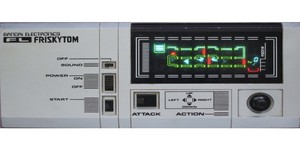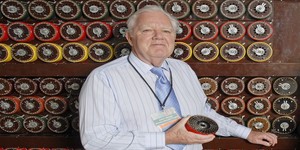TNMOC to record, publish audio archive
January 27, 2015 | 11:53
Companies: #british-library #history #tnmoc

The National Museum of Computing has announced a project to catalogue its archives in a somewhat unusual fashion: by sound, which will then be reworked into music.
Dubbed the Imitation Archive, the project is the work of award-winning composer Matt Parker and is due to start later this month following the successful application for Arts Council funding. Parker will spend his time recording and archiving the unique sounds of the Museum's various exhibits, from original machines to recreations and rebuilds, to create an archive to be stored both at TNMOC and at the British Library Sound Archive as a catalogue of the sound of computing progress over the last 70 years.
'The sounds of handheld devices are all around us today and I am thrilled to have the opportunity to look back to where modern computing began, in Bletchley, and trace the rapid growth of technology through an original sound archive,' explained Parker of his project. 'I want to explore the sonic impact of computing within contemporary society. The National Museum of Computing offers a truly unique place to hear these sounds across the decades.'
The archive only represents part of Parker's project, however. Once recorded, the sounds are then to be worked into a series of linked music tracks designed to reflect the development of computing from the early days of Colossus through to the modern era. In this, Parker will be building on similar work carried out by chiptune artist Matthew 'Pixelh8' Applegate for his album Obsolete?, which also used recordings of machines running at the Museum as its canvas.
'Our Museum carries a message that is relevant to everyone. We are delighted to see rapidly increasing interest and enthusiasm about our work from commerce and education, arts and media and of course individuals and families,' claimed TNMOC chair Tim Reynolds. 'We very much look forward to Matt Parker’s take on the audio history of computing.'
As the project gets underway, previews and snippets will be published on the Museum's official website.
Dubbed the Imitation Archive, the project is the work of award-winning composer Matt Parker and is due to start later this month following the successful application for Arts Council funding. Parker will spend his time recording and archiving the unique sounds of the Museum's various exhibits, from original machines to recreations and rebuilds, to create an archive to be stored both at TNMOC and at the British Library Sound Archive as a catalogue of the sound of computing progress over the last 70 years.
'The sounds of handheld devices are all around us today and I am thrilled to have the opportunity to look back to where modern computing began, in Bletchley, and trace the rapid growth of technology through an original sound archive,' explained Parker of his project. 'I want to explore the sonic impact of computing within contemporary society. The National Museum of Computing offers a truly unique place to hear these sounds across the decades.'
The archive only represents part of Parker's project, however. Once recorded, the sounds are then to be worked into a series of linked music tracks designed to reflect the development of computing from the early days of Colossus through to the modern era. In this, Parker will be building on similar work carried out by chiptune artist Matthew 'Pixelh8' Applegate for his album Obsolete?, which also used recordings of machines running at the Museum as its canvas.
'Our Museum carries a message that is relevant to everyone. We are delighted to see rapidly increasing interest and enthusiasm about our work from commerce and education, arts and media and of course individuals and families,' claimed TNMOC chair Tim Reynolds. 'We very much look forward to Matt Parker’s take on the audio history of computing.'
As the project gets underway, previews and snippets will be published on the Museum's official website.

MSI MPG Velox 100R Chassis Review
October 14 2021 | 15:04








Want to comment? Please log in.